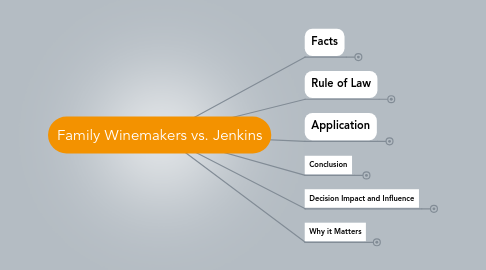
1. Facts
1.1. Three-Tier System of Producer, Wholesaler and Retailer
1.1.1. Producers need license to sell to Wholesaler
1.1.2. Wholesalers need license to sell to Retailer
1.1.3. Retailers need license to sell to customers
1.1.4. Direct shipping lets customers directly order wines from a winery that a wholesaler may not be willing to distribute
1.1.4.1. Direct shipping removes middle men in distribution channels, thus removing costs via wholesaler and retailer markups
1.2. Prior to 2005 Massachusetts law only allowed in-state wineries to get licenses to combine distribution methods
1.2.1. This law was invalidated based on facially discriminatory state laws
1.3. 2006 Massachusetts law doesn't distinguish between in and out-of-state wineries for direct shipping licenses
1.3.1. The 2006 Law looks at small vs. large wineries
1.3.2. Large winery defined as producing 30,000 gallons or more of wine, all outside Massachusetts
1.3.2.1. Large wineries can sell directly to customers or distribute wines to wholesalers only, but not both
1.3.3. Small winery produces less than 30,000 gallons
1.3.3.1. Small wineries can use wholesaler distribution, direct to retailers and direct to customers
2. Rule of Law
2.1. The Rule of Law in this case is the Commerce Clause
2.2. The Commerce Clause is meant to prohibit burdening business excessively for interstate business
2.3. State law is supposed to regulate evenhandedly with only incidental impacts to interstate commerce
3. Application
3.1. The facts of the case conflict with the rule of law since the 2006 Massachusetts law is discriminatory, limiting distribution channels
3.2. The 30,000 gallon demarcation between large and small wineries is arbitrary
3.2.1. Large wineries produce 98% of all wine in the U.S. and are located outside the state of Massachusetts
3.3. The small wineries have a competitive advantage since they're not deprived of the benefits from combining distribution methods
3.3.1. These benefits include efficiency by serving complementary markets and offering a full suite of wines to customers, thus increasing sales
3.4. The 2006 law altered the competitive balance to favor Massachusetts wineries
4. Conclusion
4.1. The court ruled that the 2006 law altered the competitive landscape, favoring Massachusetts's wineries vs. out-of-state companies
5. Decision Impact and Influence
5.1. Winemakers vs. Jenkins has influenced case law and been cited in cases where possible discriminatory practices were unfairly disadvantaging one party vs. another
5.2. Coors Brewing Co. v. MÉndez-Torres, 678 F.3d 15, 2012 U.S. App. LEXIS 8634 (1st Cir. P.R. 2012)
5.2.1. Puerto Rico's beer excise tax scheme taxed large scale brewers at a higher rate than small scale brewers
5.2.2. Coors contends that the Puerto Rico courts impermissibly refuse to consider legislative history in determining whether a law has a constitutionally discriminatory purpose, thus hindering Coors from presenting claims. Family Winemakers vs. Jenkins is then cited
5.3. Directv, Inc. v. State, 2015 Fla. App. LEXIS 8909, 40 Fla. L. Weekly D 1375 (Fla. Dist. Ct. App. 1st Dist. June 11, 2015)
5.3.1. In the case, the sales tax satellite providers had to pay were discriminatory in effect because similarly-situated entities like cable companies, which were in-state, didn't have to pay the same taxes, thus conferring an advantage upon cable services. Family Winemakers vs. Jenkins is then cited
6. Why it Matters
6.1. This case matters because business owners should not have to operate at a competitive disadvantage due to discriminatory laws in place
6.1.1. Florida's tax laws have been altered in a case involving DirecTV, which ruled in their favor, after the laws in place were found to be discriminatory and impacted similar companies, in this case cable operators, disproportionately by burdening out-of-state satellite competitors
6.1.1.1. As a result of the court finding in favor of DirecTV, business practices have been altered since satellite companies can now operate in Florida without a competitive disadvantage by paying more in taxes vs in-state competitors who are cable operators
6.1.2. A situation similar to that of Winemakers vs. Jenkins happened in the state of Illinois whereby the states system prevented out-of-state beer brewers from competing on equal terms with in-state brewers, thus violating the Commerce Clause
6.1.2.1. The courts found in favor of the plaintiff so Illinois may no longer permit in-state brewers to distribute their products directly to retailers without affording out-of-state brewers the same ability
